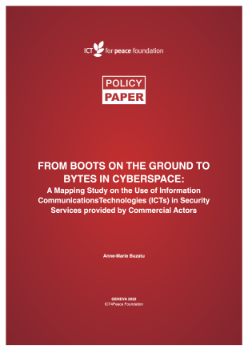Groundbreaking ICT4Peace Study:
by Anne-Marie Buzatu, ICT4Peace Executive Director
Executive Summary
This Mapping Study aims to shed light on how commercial actors are using information and communications technologies (ICTs) in the provision of private security services. The original idea behind the study wasto look at how “traditional, boots on the ground” private security companies, such as the members of the International Code of Conduct Association (ICoCA), were incorporating ICTs into physical security offerings. However, research and interviews painted a more complex portrait of how ICTs were being used by commercial actors in security-related activities and services, including anti-terrorism, intelligence-gathering, digital forensics and protection against cyberattacks.
Importantly, the findings highlight that the capture, storage, analysis and utilization of a multitude of data points or information is intrinsically intertwined with security services and security provision, and that this information acquisition and instrumentalization in the information age in which we live impacts our enjoyment of human rights. Therefore, a human-centric approach to private security services requires practices that safeguard information.
Looking through a human-security lens, the study takes stock of the evolving nature of the private security sector, identifying characteristics of commercially provided ICT-enabled security services that are similar as well as different to earlier private security paradigms. In so doing, it explains some of the characteristics particular to ICTs, and highlights human rights risks and impacts posed by these services.
In particular it highlights four important shifts in the contextual underpinnings of the notion of “security”:
1) State-centric to human-centric,
2) State actor to private actor,
3) Territorial to extraterritorial, and most recently
4) Physical to virtual.
It then takes stock of other relevant oversight and governance initiatives that have endeavored to fill some governance gaps posed by commercial actors impacting human rights, providing a recent historical overview with a view to identifying lessons learned and good practices that could be applied to the use of ICTs in private security services.
The heart of the study, the actual mapping of the kinds and types of uses of ICTs in the provision of security services, follows. In presenting the different kinds of ICT-enabled private security services, several case studies are included in order to help bring them to life and to illustrate more vividly the human rights impacts and risks.
A special section is devoted to the use of ICTs in the conflict in Ukraine, which began in the latter stages of research for the study.
This is followed by a consideration of human rights impacts and cross-cutting issues as well as the translation of principles such as due diligence, transparency and accountability into the ICT space.
The study finishes with some recommendations for next steps:
- Identify gaps in existing relevant norms and regulatory frameworks;
- Update existing relevant regulatory frameworks;
- Coordinate it through a multistakeholder platform;
- Develop effective oversight and remedial processes.
- Develop capacity-building for relevant companies;
ICT4Peace would like to thank the Swiss Federal Department of Foreign Affair’s Peace and Security Division for their generous support in funding this mapping study.

